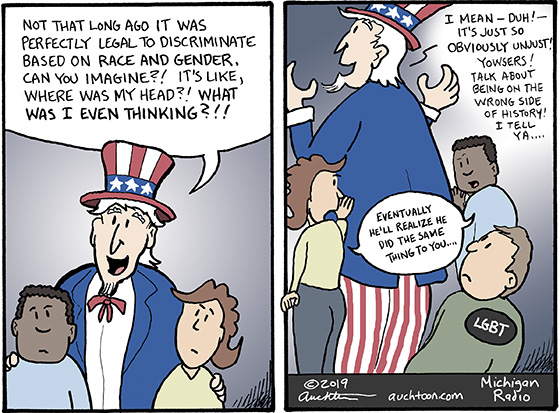Eventually He’ll Realize He Did the Same Thing to You

This week the US Supreme Court heard cases involving the firing of gay and transgender people from their jobs. The defendants claimed they lost their jobs because of their sexual orientation or gender identification and that this constitutes sexual discrimination. The prosecution argued that sex means strictly whether you’re a male or female, not whether you’re gay or straight.
The transgender woman, Aimee Stephens, is from Michigan — she worked for six years as a funeral home director, but was let go two weeks after telling her boss she was transgender and would be dressing as a woman.
NPR had excellent coverage of the trial, and I would encourage you to read it if you want to know details. But the particular part that struck me was the focus on the 1964 Civil Rights Act and its Title VII, which addresses employment discrimination based on sex: Justice Samuel Alito noted that Congress in 1964 didn’t have gay and transgender employees in mind at all. Justice Ruth Bader Ginsburg chimed in that sexual harassment was not even a legal concept in 1964, and yet the court decades ago found it to be prohibited conduct under the 1964 law.
It’s both fascinating and agonizing to see the legal gymnastics performed in the decision-making process. It may seem very obvious to us what the right thing to do is. But there has to be justification. The case has to be built and tested if that “right thing” will eventually stand.
And that’s just to get it right legally. Putting it into practice is even more difficult. Remember the lyric for the Bruce Hornsby song?
Well, they passed a law in ’64
To give those who ain’t got a little more
But it only goes so far
Because the law don’t change another’s mind
When all it sees at the hiring time
Is the line on the color bar, no
That’s just the way it is

